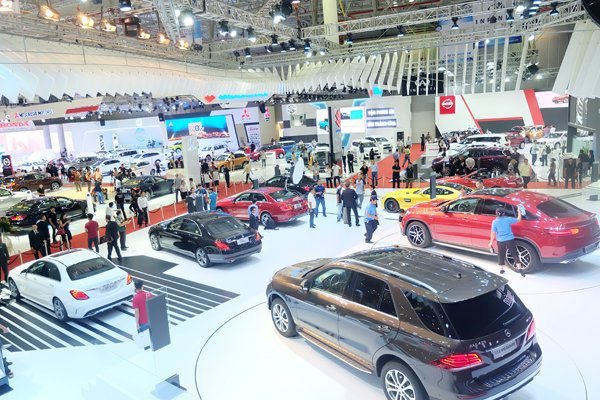Many regulations in the Government’s Decree 116 on auto manufacture, assembly, import, maintenance and warranty services are not aligned with international practices, sending auto imports into a tailspin, heard the Midterm Vietnam Business Forum 2018.

Cars are on display at an exhibition. Business executives at the Midterm Vietnam Business Forum 2018 say Decree 116 has kept auto imports in limbo
The forum was held by the Vietnam Chamber of Commerce and Industry, the World Bank, and the International Finance Corporation, a private lending arm of the world lender in Hanoi City on July 4.
Since early this year, car imports in certain weeks or months have almost ground to a halt, as Decree 116 lays down rigorous quality, technical safety and environmental protection requirements for imported completely-built-up (CBU) cars.
The decree forces car importers in Vietnam to obtain Vehicle Type Approval (VTA) certificates from authorities in exporting countries, but this certification is new to them. Though authorities in some Asian and European countries have flexibily come to terms with the VTA requirement, the importation of CBU cars is just beginning to revive.
Toru Kinoshita, head of the Vietnam Business Forum’s (VBF’s) Automotive Working Group, said some administrative regulations stipulated in the decree have left adverse effects on the business activities of CBU and completely-knocked-down cars.
Kinoshita cited auto traders as saying that each shipment of their auto vehicles is subject to all checks on exhaust emissions and safety. They find it tough to comply with this regulation, as it costs them a great deal of time and money.
“According to our current statistics, one shipment was imported to each of HCMC and Haiphong in March 2018. The time taken for testing emissions and safety lasted up to three weeks. As the number of vehicles imported from Thailand and Indonesia will rise in the coming period, the testing period may last even longer,” he noted.
Given that no cars were imported from Europe in the January-April period, the European Chamber of Commerce in Vietnam said that Decree 116 and the Transport Ministry’s Circular 3/2018 guiding the execution of the decree, which require checks on all auto shipments, are completely contrary to Vietnam’s commitments to the European Union-Vietnam Free Trade Agreement.
The trade pact requires Vietnam to accept certificates by the European Commission for imported cars and auto parts without checks or rechecks.
Meanwhile, locally made new car models are subject to checks every three years. Kinoshita said that the testing is an unnecessary requirement that makes life more difficult for auto importers and creates discrimination between domestically produced and imported vehicles, which also violates Vietnam’s commitments to the World Trade Organization.
The VBF’s Automotive Working Group suggested the Ministry of Transport and Vietnam Register check emissions and safety on the first auto shipment only and accept testing reports on other shipments.
However, Deputy Minister of Transport Nguyen Van Cong told the participants of the forum that checking every shipment had been strictly enforced to safeguard the legitimate rights and interests of consumers.
Cong said if the ministry follows the recommendation, the practice may entail high risks, making way for the entry of low-quality products into the Vietnamese market, with high-quality products being placed in the first shipment for testing.
Citing a case of Ford Vietnam, he said that the company had imported four vehicle models into the country. As competent authorities checked exhaust emissions by shipment, two of the four models were found to have failed the Tier 4 emissions standards.
“The method of checking each shipment of imported cars, as stipulated in Decree 116, is necessary to ensure the consistency of imported cars’ quality, thereby creating a level playing field for locally made or assembled vehicles and protecting the legitimate rights and interests of consumers,” he added.
SGT